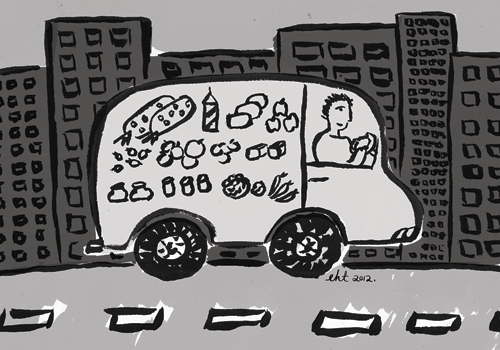
It’s not every day that we see a practical application of what we learn in the classroom toward our day-to-day lives.
Rarely do we sit in our statistics classes and daydream about all the ways we can change the world through data collection—or maybe it’s just me.
In any case, the point is such daydreams may not be as far from reality as we think. A group of PSU students decided just that— and are now, in fact, changing the world, one pop-up mobile grocery store at a time.
Yup, that’s right. Pop-up mobile grocery store.
In a city where pop-up stores and carts are commonplace, former graduate students in PSU’s School of Business Administration Amelia Pape and Colin Gallison took the idea to a whole new level a little over a year ago. Along with fellow co-founder Eric Johnson, they conceived the idea of taking grocery stores to the streets that essentially pop-up wherever they please.
But not just any grocery store—a store on wheels. The My Street Grocery truck, stocked with fresh fruits, vegetables, milk and other necessities, makes stops in neighborhoods to serve customers who might otherwise not have access to such a variety. Pape said in an email, “We serve people who face barriers to healthy eating. Common barriers include mobility, lack of transportation, financial constraints, time, cooking interest or ability and physical proximity to a grocery store.”
People, like the elderly, who can’t make it to their local store regularly subsist on non-perishable foods, which are often lacking in nutrition and abundant in artificial preservatives.
But it’s not just seniors. A recent survey revealed that 40 percent of Portlanders live in areas with limited access to a large grocery store or supermarket. These are known as urban deserts—a subject that Pape focused on in her Pioneering Innovation class at PSU, where she was challenged to look at current market flaws and develop a responsive solution.
What started out as a class project turned into a full-fledged business, and one that has more than just profits as its bottom-line.
What’s crucial about this venture is the potential for a varied and broad group of stakeholders. My Street Grocery got off the ground thanks to a Kickstarter campaign that raised nearly $13,000, making it a community-driven enterprise rather than a bank-owned one.
This bought them their first truck, effectively putting wheels on their vision. Further, they have developed key relationships with local companies to provide them with items at a fair cost, so that their prices can remain competitive with the large, corporately owned mega-markets.
Engaging the local community in their enterprise is what makes this such a unique and exciting business. In an interview with Fast Company, Pape revealed that their “long-term goal is to offer micro-franchises to community members as a means of expansion into new neighborhoods, but without losing the local ties to each community that are so important to us. We also think it would be really cool to give the people the opportunity to become entrepreneurs.” Agreed.
What’s equally cool is that this small company is taking on the huge task of debunking the commonly held belief that eating healthy is impossible in lower income communities.
In a 2011 study in the Archives of Internal Medicine, fast food companies had the highest boosts in sales when built in low-income areas. My Street Grocery is out to change that statistic, and it seems to be working. When asked what their most popular items were, Pape proudly responded, “We’re thrilled that fresh produce is a top seller…sweet potatoes just flew off the shelves.”
What’s also key is that their food comes with meal plans and recipes—what they call dinner kits, providing simple instructions on how to assemble a well-balanced meal. This can be critical for those who want to eat healthy but are unfamiliar with how to prepare some types of food, or for the elderly who may need extra help.
In a recent KGW News story, the My Street Grocery truck was shown pulling into a local senior living community. It was heartwarming to see the individual care that Pape, Gallison and Johnson were able to give their patrons. A far cry from the huge, unfriendly supermarket produce sections where the announcements blare loudly over the intercom and the staff are scarce.
The trio bagged up individual heads of lettuce whilst chatting with their customers. One couldn’t help but think, “Isn’t this the way it should be?”
Pape said coming into the MBA program, she had no idea she’d end up an entrepreneur, let alone the president of a company. And yet, here she is.
She doesn’t claim that it’s been easy, in the least. Saddled with as much debt as the average student and running a business that doesn’t exactly scream “invest” to big-time venture capitalists, finding a way to make ends meet can be a tight rope walk. So, she observed, it takes a whole lot of creativity and flexibility. “I work a couple of side jobs with very flexible hours that allow me to keep my focus primarily on My Street.”
So it’s not a walk in the park. But one could look at it this way—money spent on our education? In the thousands. Hours spent studying? Hundreds. The chance to see what you learn in theory become reality? Priceless.
When asked what one of her key learning experiences was, Pape points to her Pioneering Innovation class that helped her identify a market failure. “That was very important because we knew we were creating a needed service that had a place in the market. You can’t say that for all new business ideas.”
Indeed.

